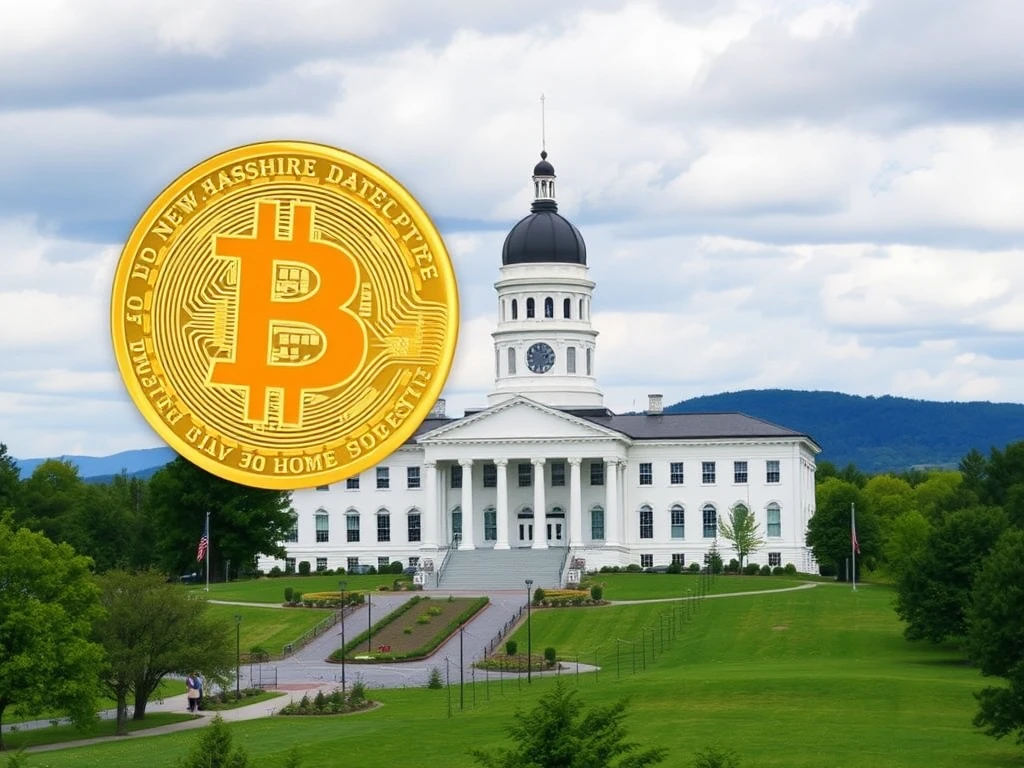New Hampshire Bitcoin Bill Advances: Crucial Senate Vote Looms

The potential for state-level investment in digital assets is taking a significant step forward in the United States. A key piece of legislation, known as the New Hampshire Bitcoin bill, is now on the cusp of a crucial vote by the full State Senate. This development is drawing attention from crypto enthusiasts and policymakers alike, as it could set a precedent for future state crypto investment strategies.
Exploring the New Hampshire Bitcoin Bill (HB 302)
The bill at the center of this discussion is House Bill 302 (HB 302). Introduced in January, this legislation aims to grant the New Hampshire state treasurer the authority to diversify a portion of the state’s general funds into specific digital assets and precious metals. The bill has navigated the legislative process, clearing the House with a 192–179 vote and recently passing its second Senate committee review with a 4-1 vote. Its next stop is a full vote by the Senate.
Key provisions of HB 302 include:
- Allowing the state treasury to invest up to 10% of general funds.
- Permitting investment in cryptocurrencies with a market capitalization exceeding $500 billion.
- As of now, Bitcoin (BTC) is the only cryptocurrency meeting this market cap requirement.
- The bill also includes provisions for investing in precious metals.
If the bill successfully passes the full Senate, it will require the Governor’s signature to become law, paving the way for New Hampshire to potentially establish a form of Bitcoin reserve.
Arguments For and Against State Crypto Investment
The journey of HB 302 through the legislature has included debate on the merits and risks of state investment in volatile assets like cryptocurrencies.
Proponents argue that such investments could yield significant returns for the state. Republican Representative Jordan Ulery suggested these investments could net a “large amount of money,” presenting it as a potential revenue-generating strategy.
Conversely, opponents raise concerns about the necessity and security of the bill. Democratic Representative Terry Spahr argued that the state treasurer already possesses sufficient authority to manage investments without this specific legislation. Spahr also voiced concerns that the bill could potentially undermine the future security of any digital asset holdings the state acquires.
The debate highlights the cautious approach many jurisdictions take when considering direct exposure to the crypto market with public funds.
New Hampshire’s Place in US Crypto Regulation
New Hampshire is not alone in exploring digital asset-related policies, but its move towards a potential Bitcoin reserve is noteworthy. The state has other blockchain-related bills under consideration, including HB 639 concerning blockchain dispute resolution and regulatory frameworks, and HB 310 focused on real-world asset tokenization and stablecoin usage.
This activity places New Hampshire among states actively examining how digital assets fit into existing legal and financial structures. It contrasts with more aggressive approaches, such as Arizona’s exploration of creating a strategic Bitcoin reserve, aiming to be the first state with such a policy.
The progress of HB 302 is a key indicator of evolving perspectives on crypto regulation US-wide, showing that states are beginning to consider not just regulating the industry, but potentially participating in it.
What’s Next for the New Hampshire Bitcoin Bill?
The focus now shifts to the full New Hampshire Senate. A favorable vote there would send HB 302 to the Governor’s desk. The outcome of this vote will be closely watched as it represents a significant milestone for state-level cryptocurrency adoption and investment policy in the United States.
Summary
New Hampshire’s House Bill 302, which could allow the state treasury to invest in cryptocurrencies like Bitcoin, has successfully advanced through committees and now faces a vote by the full Senate. The bill proposes investing up to 10% of general funds in assets like Bitcoin, aiming for potential returns but also facing opposition regarding necessity and security. This development positions New Hampshire as a state actively exploring digital asset integration, contributing to the broader conversation around state crypto investment and crypto regulation US-wide. The upcoming Senate vote is a critical step that could pave the way for a unique Bitcoin reserve policy.










